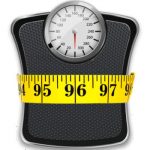We live in a culture that emphasizes all the wrong metrics. Many people believe that getting fit includes the number on a scale, the number on a clothing tag, and the number on a nutrition label. I propose we de-centralize those numbers as they are not true measures of fitness. In this post, I would like to discuss numbers that do matter.

Conventional Fitness Goals
In several of my posts, I have discussed how it is important to have fitness goals to stay motivated. Probably the most common fitness goal is to lose weight (see 2015 New Year’s Resolutions). I guess this makes sense as everything around us tells us that we need to lose weight. For example:
- Labels that say X calories per serving and other misleading food advertisements: Leanwashing Index 2013 list – 100 calories
- Diet plans that track the number on a scale: Weight Watchers – JOIN FREE and the first 10 lbs on us
- Advertisements about how people lost a lot of weight by eating at a certain restaurant: Subway – Jared lost over 200 lbs eating Subway sandwiches
The problem is, true fitness is not based on these numbers. In my experience, these numbers either had no bearing on fitness or perpetuated *un*fitness.
Alternative Approach
CrossFit has equipped me to look at numbers that matter, including:
- The weight I am lifting: deadlift, back squat, clean and jerk, snatch, etc
- How often I am working out: I have to sign in every time, and I can track my progress on my phone
- Fitness achievements: mile time, 2K row time, hero WOD time, etc
- Calorie sources: protein vs. carbs vs. fat
What I learned about fitness metrics:
- It is NOT counting the calories in food, as not all food is created equal. To be clear, this is not to say that calories do not matter, but instead to understand the calories you are consuming as well as track caloric intake with physical expenditure.
- It is NOT weighing yourself as weight and Body Mass Index (BMI) does not equal fitness. To be clear, this is not to say that bodyweight does not matter, but instead to put bodyweight in context to fitness, including strength training and accomplishments.
The outcome of this alternative approach for me was the creation of S.M.A.R.T.E.R. fitness goals which encouraged measurable and time-based goals that were either based on process or outcome but not based on body weight.
Summary
The conventional approach to fitness does not work. If fitness is conceptualized based on metrics that matter, then success will follow. Stop looking at the scale, stop worrying about the clothing size, and stop merely counting calories. Start tracking your strength training, start tracking your workouts and start tracking your achievements.
You can achieve fitness by focusing on the metrics that matter.
© 2015 – 2021, Steve Flanders. All rights reserved.
